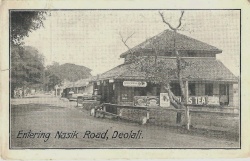Deolali
| Deolali | |
|---|---|

| |
| Presidency: Bombay | |
| Coordinates: | 19.951°N, 73.834°E |
| Altitude: | 515 metres (1,690 ft) |
| Present Day Details | |
| Place Name: | Deolali |
| State/Province: | Maharashtra |
| Country: | India |
| Transport links | |
Deolali cantonment, situated about 3½ miles to the south west of Nasik , was established in 1869. It was used as a transit camp for nearly all troops proceeding to and from Bombay and Britain.
In addition to the soldiers assembled after finishing their tour of duty, the troops waiting there also included mentally ill soldiers sent from all over India, who were being repatriated to Britain on medical grounds. In the nineteenth century, troopships sailed on a seasonable basis only in winter and spring, and soldiers posted there after March had to wait until October or November before voyages recommenced. The slang words doolally or doolali, or doolali-tap, are used to describe someone who is "out of one's mind" or crazy. The second part is a Hindustani word for fever, although in Sanskrit,‘tapa’ means simply heat or torment. Taken literally, it is best translated as ‘camp fever’. These expressions are derived from Deolali, where some soldiers went mad, waiting for extended periods for ships to take them back to Britain.
Also see
External links
- History of Deolali Deolali Cantonment Board
- 1870 Photograph: A view of the Deolali cantonment near Nasik
- "The madness at Deolali" by N A Martin Journal of the Royal Army Medical Corps. 2006 Jun; 152 (2):94-5 html version original pdf, now an archived page.
- Reading between unwritten lines: Australian Army nurses in India, 1916-19 by Ruth Rae Australian War Memorial website. Describes the 34th Welsh General Hospital (34 WGH) at Deolali
- From notes in the Australian Archives regarding 34 Welsh General Hospital in Deolali : Sister Alma L. Bennett, Matron in 1917, said: ‘containing 3000 beds – 4 hrs train journey from Bombay'. ... Our cases were all from Mesopotamia – some direct – others individually coming from various Bombay Hospitals… We also had 200 Turkish Prisoners of War, almost all Surgical cases, some with shocking wounds – septic.’ Matron Gertrude Davis said: ‘When we became a P. of W. hospital our number of beds was increased to 700, 200 for British and 500 for prisoners as later we had the German prisoners from East Africa also an occasional one from Mespot’. [1]
- Who Do You Think You Are? - Alan Cumming. Alan’s grandfather was treated during World War 2 at Deolali - well known for housing psychiatric patients. However, this section was removed from his Army service record, perhaps because of the stigma attached to mental illness at the time. ancestry.co.uk
- Reminiscences of Professor R H Girdwood, Royal Army Medical Corps, WW2. He served at Deolali for a short period of time. scotsatwar.org.uk
- Photograph: Cathay Picture House, Deolali Captioned "My Grandfather, James Wilson. Serving with the Royal Artillery in India during WW2. Taken in Deolali, India in the 1940s."
- "Family footsteps in Deolali" by Tom Spender March 20th, 2011 from his Blog.
- Deolali or Devlali. wegunners.webs.com
- Deolali: An Idyllic Town by Nidhi Kulkarni January 11, 2009 theviewspaper.net. Mentions an Artillery Museum,
Historical books online
- "Deolali" Imperial Gazetteer of India, Volume 11, page 246.
References